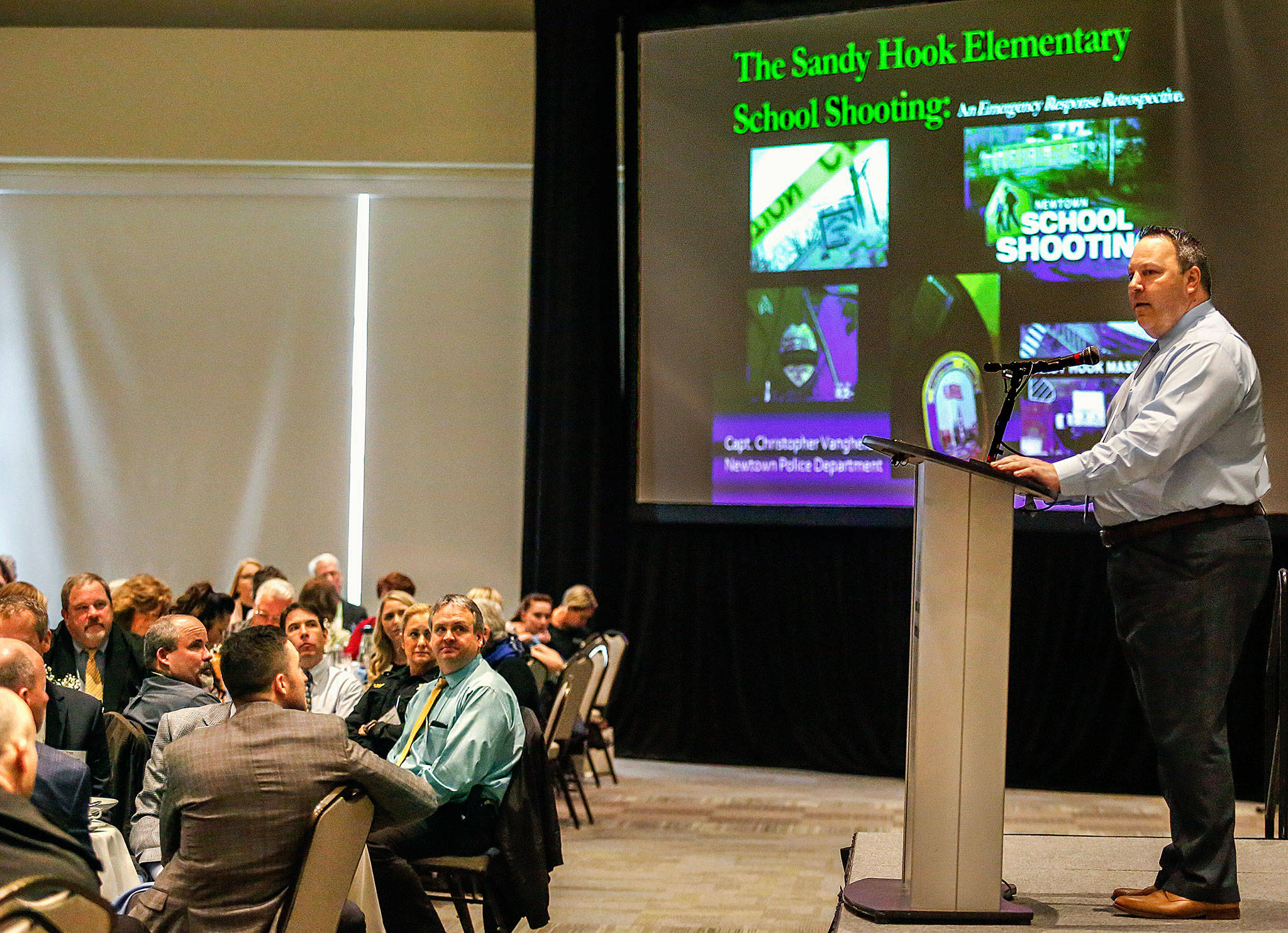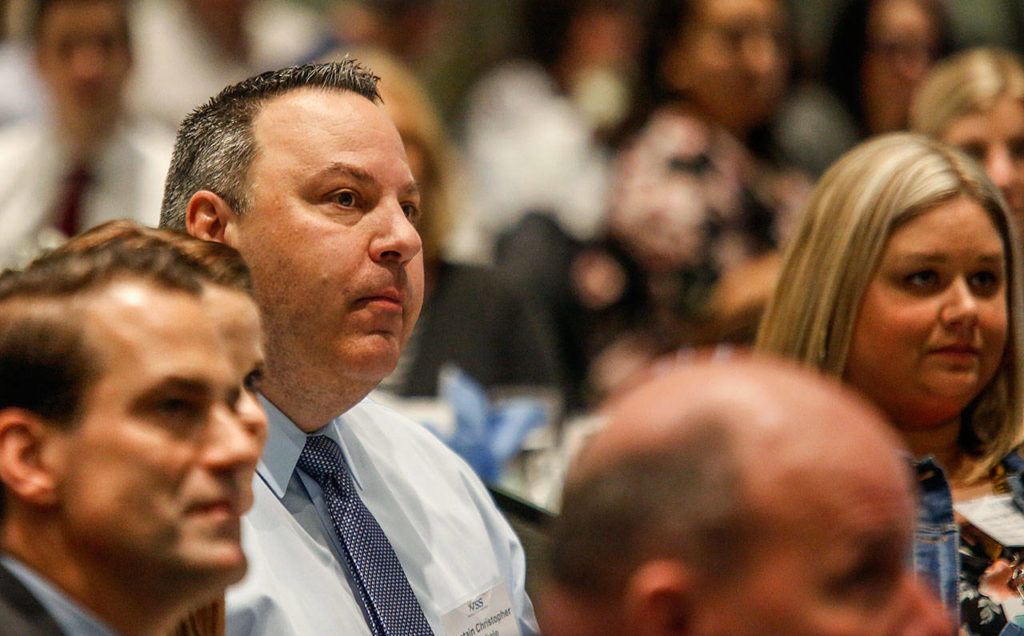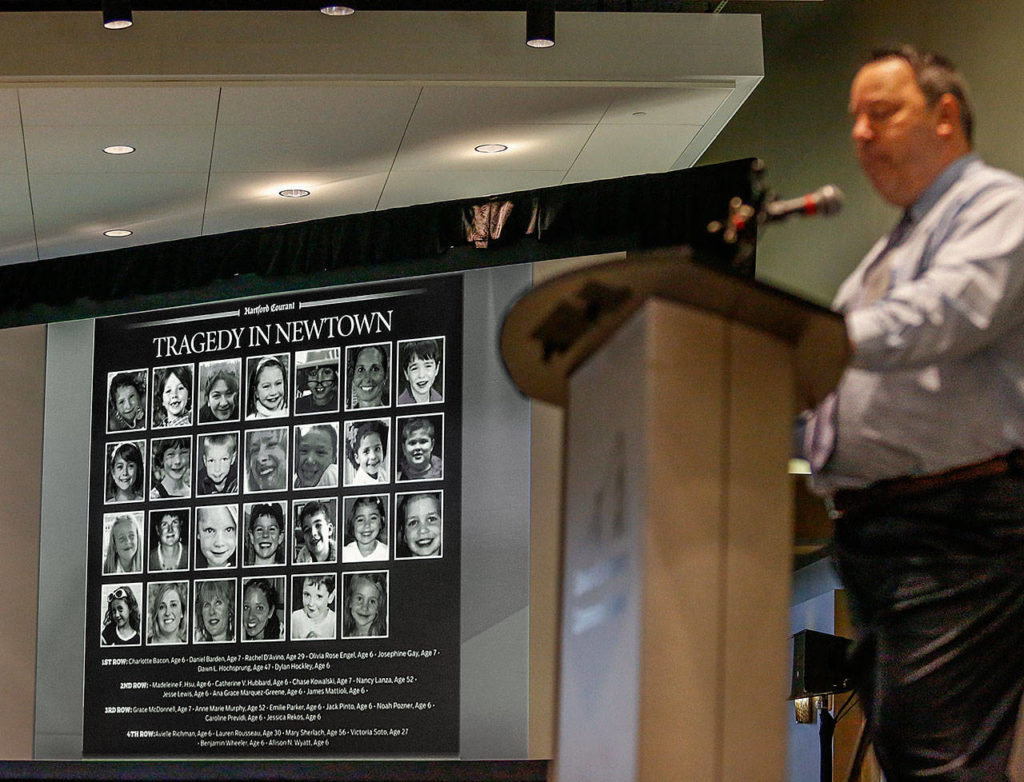The day before a gunman massacred 20 first graders and six adults at Sandy Hook Elementary School, Christopher Vanghele was at a police training in Rhode Island. The talk centered on school shootings.
Vanghele, then a lieutenant with Newtown Police Department, didn’t imagine his Connecticut community of 28,000 would ever see such a horrific act. Now a Newtown police captain, he said he was thinking “there’s no way an incident like that would happen in my sleepy town.”
On Wednesday, more than 250 people at a fundraising luncheon for Victim Support Services in Everett fell silent as Vanghele shared the 911 call from Sandy Hook. It came just after 9:35 a.m. on Dec. 14, 2012.
“Sandy Hook School,” the caller said. “I think there is somebody shooting in here, in Sandy Hook School.” Questioned by the operator, the caller frantically described seeing someone with a gun: “They’re running down the hallway … they’re still shooting.”
Hearing that 911 call “still gives me chills,” Vanghele told law enforcement officers and other champions of Victim Support Services. They listened intently to Vanghele’s keynote talk in the Edward D. Hansen Conference Center at Angel of the Winds Arena.
Victim Support Services is the oldest victim advocacy agency in Washington, and was one of the first in the country. Since 1975, the Everett-based nonprofit has helped people affected by crime. It offers crisis intervention, support groups, counseling referrals, help with victim compensation and more.
“Active shootings can happen anytime, anywhere — schoolyards, military bases, churches, nightclubs,” said Vanghele, a 25-year veteran of Newtown’s police force.
He was a school resource officer in 1999 when two shooters killed 13 people and themselves at Colorado’s Columbine High School. That was the start of what he said were “modern-day” mass shootings. His takeaway from that shooting: “I wasn’t going to wait to go inside,” Vanghele said.
The day of the Sandy Hook murders, that’s what Vanghele and two other officers did, entering through a side door. “We were the first ones to enter,” he said.
They saw broken glass, and the bodies of Sandy Hook’s principal and a school psychologist. He had known the principal, Dawn Hochsprung, when she was at his daughter’s school. Vanghele spoke of finding more dead teachers, the body of the gunman who had shot himself, and “the rest of them” — 20 children who would never go home or start second grade.
Vanghele had to slip his badge under a locked door to convince one teacher in hiding that he was an officer. And he didn’t learn until a year later that a survivor, a boy he carried out of the school, was the child of a state policeman he had seen that awful day calling out “Where’s my son, where’s my son?”
His harrowing talk anchored an event that also included the presentation of Victim Support Services’ first-ever Power of One Award. It was given to King County Sheriff’s Detective Scott Tompkins.
Tompkins was lauded by King County Deputy Prosecutor Don Raz and Detective Mike Garske, of the King County Sheriff’s Office, for dedication to victims and their families. The 2007 Christmas Eve killings of six family members in Carnation were among the cases he has investigated.
Vanghele spoke of the days, weeks and years after the Sandy Hook rampage. Pictures of the 26 victims became part of what he called “a cascade of photo arrays,” images of people killed in mass shootings from Columbine to Marysville Pilchuck High School, and from Florida’s Pulse nightclub to the Las Vegas Strip.
The Newtown victims’ loved ones were helped by family liaison officers. “Every single one had their own personal officer,” said Vanghele. Police became “part of their family,” he said. Those officers made sure parents knew investigation details before others, and helped them through birthdays and holidays.
It was a long haul determining who would benefit from $12 million in donations to a United Way fund for victims. As a first responder, Vanghele said, he received funds for therapy. “Money might be ugly, but money is important,” he said.
Gun laws also are important. “It was a dark day in our history,” Vanghele said, when “common-sense gun legislation” proposed by President Barack Obama after the Sandy Hook killings didn’t make it through Congress. Since Sandy Hook, he said, there reportedly have been 239 school shootings, with 438 people shot and 138 killed.
He favors armed security guards at school entrances as a potent deterrent.
Michaela Weber, executive director of Victim Support Services, noted the theme of the luncheon: “empathy, advocacy, resiliency.” Sharing advice she has given to her teenage stepdaughter, she said, “Don’t look down and don’t look back, because that’s not where you’re going.”
It’s an outlook Victim Support Services strives to share as it helps people harmed by crime. Vanghele, after the incomprehensible horror of Sandy Hook, learned that the road to rebuilding lives is a long one.
“I’m considered a first responder. I get there first, in mere minutes,” he said. “You guys working with victims, that can take years and years.”
Julie Muhlstein: 425-339-3460; jmuhlstein@heraldnet.com.
Learn more
Victim Support Services helps victims of crime through advocacy, education and awareness. Information: http://victimsupportservices.org/
Talk to us
> Give us your news tips.
> Send us a letter to the editor.
> More Herald contact information.



























